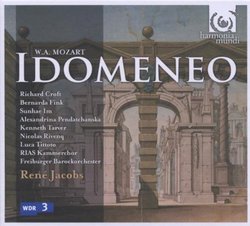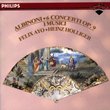| All Artists: Sunhae Im, Alexandrina Pendatchanska, Bernarda Fink, Richard Croft, Nicolas Rivenq, Luca Tittoto, René Jacobs Title: Mozart: Idomeneo Members Wishing: 1 Total Copies: 0 Label: Harmonia Mundi Original Release Date: 1/1/2009 Re-Release Date: 6/9/2009 Album Type: Import Genre: Classical Styles: Opera & Classical Vocal, Chamber Music, Historical Periods, Classical (c.1770-1830) Number of Discs: 3 SwapaCD Credits: 3 UPC: 794881911523 |
Search - Sunhae Im, Alexandrina Pendatchanska, Bernarda Fink :: Mozart: Idomeneo
CD DetailsSimilarly Requested CDs |
CD ReviewsThe Best of Rene Jacobs's Mozart Recordings R. Gerard | Pennsylvania USA | 05/22/2009 (5 out of 5 stars) "Rene Jacobs has been revolutionizing the way we perform Mozart's comic operas since his release of Cosi Fan Tutte almost a decade ago. This recording of Mozart's best known opera seria, Idomeneo: King of Crete, is the fifth and latest of Jacobs's readings of Mozart's mature operas. His Figaro and Cosi were vivacious and elegant, his Titus breathed new life into the oft-neglected piece, his Giovanni was extraordinary, but his Idomeneo combines what Jacobs knows best about opera seria and about Mozart. After all, Jacobs has always been a champion of Baroque opera seria from Monteverdi, to Scarlatti, to Haendel. In this Classical opera seria, we find Jacobs completely in his element. I do not hyperbolize when I say this is perhaps his best Mozart recording to date. I must say that Idomeneo is a hard opera to get "right." Having owned and listened to several, there has always been something missing from each. It is unlike any other Mozart opera, not only in that it is so serious, but in that it is relatively long, Mozart was working with a librettist with whom he disagreed artistically (he lacked the artistic compatibility he later had with Da Ponte), and with singers whose abilities he disparaged. Idomeneo is very experimental in structure; it's not an opera buffa or singspiel like his other, more popular mature operas- but its style draws heavily on the reforms of Glueck. He planned to rewrite the opera years later for Vienna, but the plans never came to fruition. Mozart made numerous cuts and additions on subsequent performances. Given these circumstances and limitations, one might think of Idomeneo as sub-par, and I've found that sadly each recording prior to this one has reflected this. There have been some who have come close, namely the one by Mackerras with the immortal Lorraine Hunt Liberson. But Jacobs has found that missing element. Jacobs allows for the ensemble, especially the continuo group, to comment on the action through dynamics, changes in tempi, and most impressively, improvisation, to give us an exciting yet authentic reading of 18th century practice. There is never a dull moment in his Mozart interpretations (his recordings of the Prague and Jupiter Symphonies included). Idomeneo is indeed a serious opera, but he remembers that opera was and is entertainment. Some listeners in the past may have been bothered by Jacob's choices in tempo. Quick tempi are definitely present here, but they are not unbearable- rather one gets the impression that Jacobs knows how to keep the action moving forward, which is beneficial to such a long opera. Alexandrina Pendatchanska impressed me greatly when I first heard her as Vitellia. I thought she'd make a great Donna Elvira, and she lived up to my expectations. Elettra is a psychologically similar character to the previous two: she is vengeful but capable of tenderness. It must be a difficult role for a soprano to sing, I imagine, but she is in her element here. I have never heard a more genuinely bloodthirsty Elettra, and in my view, she steals the show. Her tasteful yet gutsy interpretations remind me very much of a Cecilia Bartoli. Elettra is a seriously demanding role, like Vitellia, requiring exceptional range and a strong lower register. Pendatchanska is the ideal woman for the job. The rest of the cast is excellent. Idamante and Idomeneo are presented as both aristocratic and tragic. It is, after all, Greek tragedy. Croft knows that his role requires acrobatic virtuosity, yet he also knows that this is opera- it is drama, acting, theater. Not only do we get a talented vocal acrobrat, but one who is in tune with his role as actor. Sunhae Im's Ilia sounds young and light, but she is by no means anemic-sounding like many soubrette sopranos who sing the role. I would recommend her recording of Die Schopfung under Spering as well as her Zerlina, also under Jacobs. I find myself becoming a devoted fan of both her and Ms Pendatchanska after more hearings and I do hope Rene Jacobs continues to employ both voices in his future recording endeavors. The chorus must also function as a memorable character in itself. It must not be overlooked. It is not merely the extra embellishment as in the opera buffa like Cosi and Figaro. Anyone versed in Greek tragedy will know the importance of the chorus. Mozart and his librettist made full use of the chorus, and Jacobs does as well. This is one area where many recordings fall short of expectations. My favorite moment in the entire opera is the finale of Act II, in which there are continuous movements alternating between chorus and soloists, and Jacobs blends the forces perfectly here. This is, at last, the Idomeneo I can listen to all the way through. Such a long, serious piece should be performed with the vitality that only Jacobs can provide. I am hoping for a Die Zauberflote soon, and await his upcoming release of Haydn's Die Schopfung with Johannes Weisser (the same young man who sang the title role in Jacobs's acclaimed Don Giovanni recording)." Try again, please Peter Peneman | Pasadena, CA USA | 07/17/2009 (2 out of 5 stars) "No, no, no, no, NO! You still haven't got it right. What is missing most dreadfully is Idomeneo himself. This performance has nothing of the heroic. Idomeneo is a king. He has been off fighting valiantly and nobly in the Troy. He is not a wimpy spoiled brat. This sounds like a tepid run-through. The voice is not centered, not resonated anywhere in particular. The pitches are not cleanly articulated. Sorry if no one has ever heard it done as it should be, and can't tell the difference between crooning through the rôle and singing it. I haven't heard it up to my standards in any of the several recordings. When Pavarotti and Domingo did it, they took simplified versions of "fuor del mar" and omitted "torna la pace" altogether. I'd have to go all the way back to Herman Jadlowker's Readers'Digest "fuor del mar" to recommend hearing this sung by a MAN and a HERO (and one with coloratura to shame all these other pretenders to the throne). Idomeneo himself has always been the weak link in other performances. Back to the drawing board." A comfy Idomeneo Angus W. Grant | Melbourne, Australia | 03/25/2010 (4 out of 5 stars) "The often revelatory approach that Jacobs brings to his interpretations of the Mozart operas is not so obvious in this recording. I think Jacobs greatest skill is bringing out the personal and intimate. He sees the humour and drama in unexpected places. This is harder to bring off in such a monumental and 'public' work as Idomeneo. Consequently, through his choices in direction and of singers he presents a slightly more inward looking and comfy interpretation.
Richard Croft exemplifies this approach. It is a smaller, sweet voice and used most intelligently. While this means the public declamations lack some impact the internal anguish is portrayed most effectively. You could swear at times that Sunhae Im is Kathleen Battle with a heart and Kenneth Tarver sings so well that Arbace's arias will actually sound like they deserve to be in the opera. Pendatchanska is real firecracker as Elettra, quite unhinged. The real star of the opera is the Freiburger Baraockorchester who have a remarkable sense of ensemble and wind playing of real beauty. If you own the intense, searing recording of Gardiner the good thing is that Jacob's approach is so different you can justify owning another set. Which you prefer will depend on your personality. It is also good to have the making of DVD as a bonus which was most illuminating." |








